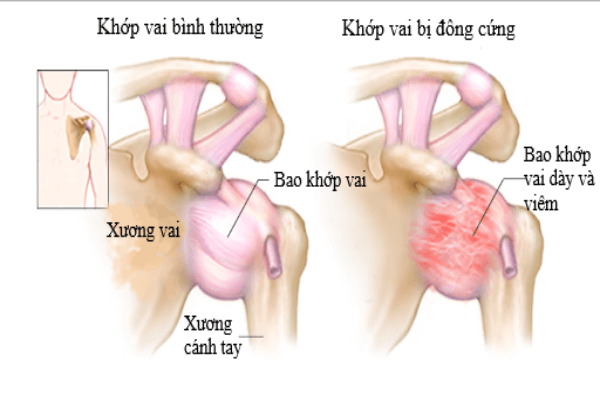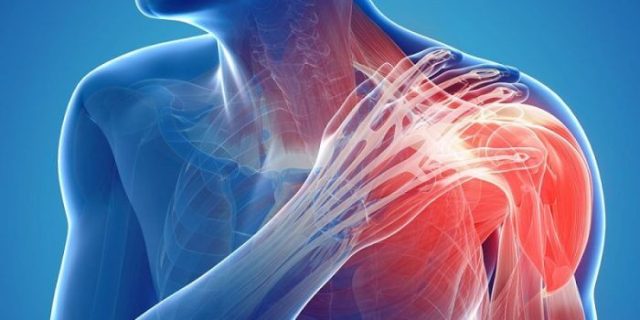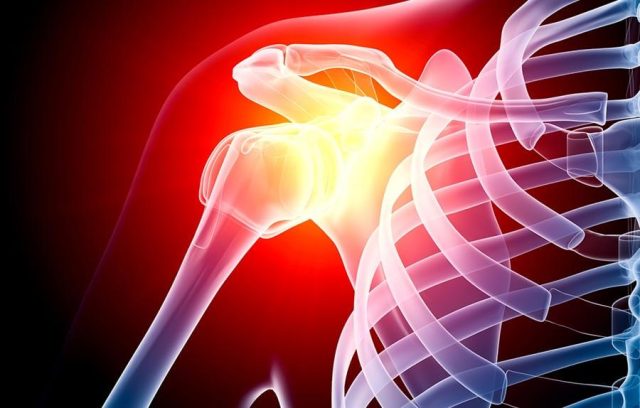Inflammation around the shoulder joint with stiffness, also known as adhesive capsulitis or frozen shoulder, is a condition where the shoulder joint becomes stiff due to the formation of scar tissue around it. It thickens and tightens the joint capsule, leading to restricted shoulder mobility. When movement does occur, it is often accompanied by severe pain and discomfort.
Understanding this condition is crucial for effective prevention and treatment.
NỘI DUNG CHÍNH
1. What is a Frozen Shoulder?
Frozen shoulder, medically termed “adhesive capsulitis,” occurs when scar tissue forms around the shoulder joint, causing the joint capsule to thicken, stiffen, and tighten. This results in limited shoulder movement and any attempt to move the shoulder is often met with pain and discomfort.

2. The condition progresses through three stages:
2.1. Freezing Stage
During this stage, pain intensity may slightly decrease, but joint stiffness worsens. The shoulder muscles may also begin to atrophy due to reduced movement. Consequently, moving the shoulder becomes increasingly tricky, hindering everyday activities.
The freezing stage typically lasts from 4 to 12 months.
2.2. Frozen stage
In this stage, the pain gradually intensifies, particularly at night. Pain becomes severe upon any shoulder movement. Simultaneously, the range of motion in the shoulder becomes highly limited, causing the shoulder to lose its flexibility and mobility.
The frozen stage typically lasts from 6 to 9 months.

2.3. Thawing stage
During this stage, shoulder movement gradually improves, eventually returning to normal. The “thawing” process can take six months to 2 years.
In total, patients with frozen shoulders may require 3 to 4 years for full recovery.
3. Causes of Frozen Shoulder
Doctors are not entirely sure why frozen shoulders develop in some individuals. However, certain risk factors can increase the likelihood of developing this condition:

– Stagnation of the shoulder region due to infrequent movement leads to reduced blood flow to the tendons and ligaments in this area, eventually resulting in stiffness.
– Shoulder injuries, fractures, strokes, or prior shoulder surgeries can increase the risk of a frozen shoulder.

– Individuals with diabetes are more susceptible to frozen shoulders. The exact reason is yet to be determined. Additionally, diabetic patients with frozen shoulders tend to experience prolonged stiffness before reaching the “thawing” stage.
– Age and gender: Those aged 40 and above, especially women, are at a higher risk of developing frozen shoulders.
4. Treatment and Recovery of Frozen Shoulder
Treatment usually improves over time, but full recovery may take up to 3 years. The primary focus of treatment is pain management and restoring joint function. Treatment options include:
Physical Therapy: Physical therapists will design a personalized rehabilitation program to manage pain and prevent the progression of a frozen shoulder. Consistent and regular exercises are essential for a complete recovery.
Surgery: Surgery may be considered when other treatment methods prove ineffective. It involves releasing the scar tissue through a surgical procedure.

Please consult a healthcare professional for a personalized assessment and treatment plan for a frozen shoulder.
Leveraging cutting-edge advancements in modern medicine, Intermec offers a standardized American approach to treating ankle joint degeneration using Bio Kit Pro therapy, a form of stem cell therapy.
Bio Kit Pro operates on automatic search, repair, and complete replacement of damaged cells caused by aging with new, healthy cells. This therapy offers several benefits:
– Rapid Pain Reduction: Significantly reduces symptoms like pain, stiffness, and joint rigidity.
– Accelerated Cartilage Regeneration: Enhances the body’s natural healing processes, forming new cartilage and bolstering the body’s self-healing capabilities.
– Improved Joint Lubrication: Enhances joint lubrication, eliminating dry joint conditions.
– Slows Down the Aging Process: Slows down joint cartilage aging and damage.
– Collagen Supplementation: Stabilizes the joint cartilage structure.
– Enhanced Mobility: Improves joint mobility, durability, and flexibility.
Notably, this is a treatment for joint degeneration that does not require medication or surgery and allows patients to continue their daily activities without needing prolonged rest. Bio Kit Pro therapy is considered a leading choice for joint degeneration treatment in the United States and Europe.





Cập nhật lần cuối: 28/05/2025
Bài viết liên quan
Causes, Symptoms, and Effective Treatment of Shoulder Osteoarthritis
Shoulder osteoarthritis is a typical joint and bone condition nowadays. It causes pain, stiffness, and reduced mobility in the shoulder and arm area. Early detection and timely treatment can slow down the progression of the disease. Let INTERMEC guide you...
Oct
Achilles Tendonitis – A Common Condition Among Athletes
Achilles tendonitis is a prevalent condition often encountered by athletes or professional sports enthusiasts. Patients typically experience prolonged and challenging discomfort that hampers their daily activities. If not promptly treated, it can lead to various dangerous complications. NỘI DUNG CHÍNH1....
Oct
Osteoporosis – A Dangerous Condition in the Elderly
Currently, the prevalence of osteoporosis within the community is alarmingly high, especially among the elderly population. Osteoporosis can directly impact the health of individuals, rendering their bones vulnerable to damage, fractures, and slow recovery. NỘI DUNG CHÍNH1. What is Osteoporosis?2....
Oct